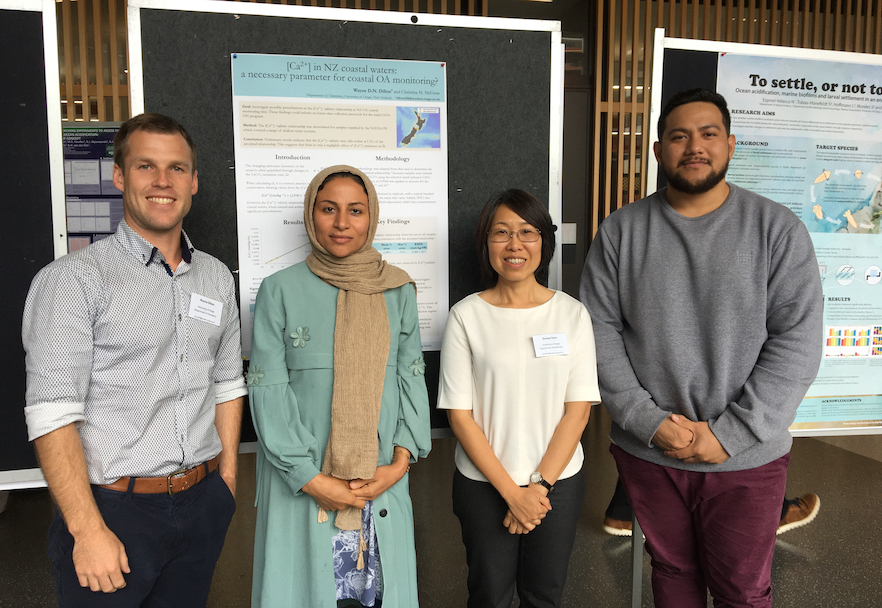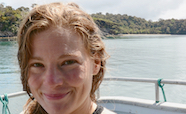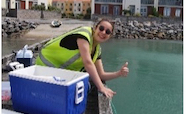
From left: Postgraduates Wayne Dillon, Habibeh Hashemi, Denise Chen and Maserota Ofoia in front of their ocean acidification research poster at the 2021 New Zealand Ocean Acidification Conference (NZOAC), held at the University of Otago.
Postgraduate students are contributing significantly to the study of our oceans as addressing global climate change becomes increasingly important for our future. This page provides examples of the research areas students are exploring.
Students are attracted to this research from a range of academic disciplines adding to the breadth of skills and expertise investigating our human impact. Many postgraduates are becoming published scientific authors as they pursue their research towards their postgraduate degrees.
Research support for postgraduates
Future Ocean supports University of Otago students through specialised training, travel support, SEED projects and summer studentships.
Email linn.hoffmann@otago.ac.nz
Research opportunities:
- Postgraduate research opportunities database provides current opportunities for postgraduate research across the University.
- Visit our people if you are looking for a potential supervisor for your postgraduate research.
Postgraduate researchers and their projects
Elliot Bean
Supervisor: Christina McGraw
Research interests: Elliot Bean is a student in the Department of Chemistry, University of Otago.
Email elliot.bean@postgrad.otago.ac.nz
Denise Chen, PhD student
 Supervisor: Christina McGraw
Supervisor: Christina McGraw
Research interests: Denise is a PhD student from the Chemistry Department at the University of Otago, New Zealand. Her project involves the development of optical fiber pH sensors to monitor metabolic activities induced pH changes in marine microenvironments.
Email denise.chen@postgrad.otago.ac.nz
Fenella Deans, PhD student
 Supervisor: Cliff Law
Supervisor: Cliff Law
Research interests: Fenella's research focuses on the response of marine bacterioplankton community composition and production to ocean acidification (OA) and warming. Additionally, the research investigates the changes to the production of the greenhouses gases nitrous oxide and methane by marine bacteria under OA and warming.
Email fenella.deans@postgrad.otago.ac.nz
Wayne Dillon
 Supervisor: Christina McGraw
Supervisor: Christina McGraw
Research interests: Wayne is a PhD student in the Department of Chemistry at the University of Otago, New Zealand, where his work focuses on the marine carbonate system and improving coastal OA monitoring practices. The goal of his PhD project is to develop both deployable and laboratory-based autonomous analytical systems for marine carbonate parameters, thereby improving OA monitoring capabilities and advancing our ability to accurately predict how the global carbon cycle and marine calcifying organisms might be affected by future ocean conditions.
Email wayne.dillon@postgrad.otago.ac.nz
Habibeh Hashemi, PhD student
 Supervisor: Christina McGraw
Supervisor: Christina McGraw
Research interests: Habibeh is a Ph.D. student and her project aims to develop automated, field-based sensors to quantify marine born DMS in the sea surface water. The major outcome of the project is the real-time analysis of DMS in short-term processes. Additionally, the sensors will be incorporated into the bi-monthly Munida Time Series to contribute to a recognised oceanographic DMS reference source for the seasonal, interannual and long-term variability of DMS on the southeast coast of New Zealand. Overall, the project can have a potential contribution to climate change mitigation as DMS can alter the earth's radiation budget.
Email habibeh.hashemi@postgrad.otago.ac.nz
Hanneloor Heynderickx, PhD student
 Supervisor: Linn Hoffmann
Supervisor: Linn Hoffmann
Research interests:Hannah Heynderickx joined the Botany department at the University of Otago (New Zealand) as a PhD student in spring 2018. Her research involves investigating the effect of Ocean Acidification on phytoplankton and bacterial community structure and dynamics using metagenomics, flow cytometry and FlowCam analysis. The research projects used to address this include identifying bacterial and protist communities at hydrothermal vents and in kelp forests, and a long-term time series analysis of protist communities along the MUNIDA transect off the south east coast of New Zealand.
Email hannah.heynderickx@postgrad.otago.ac.nz
Anna Kluibenschedl, PhD student
 Supervisor: Miles Lamare
Supervisor: Miles Lamare
Research interests: The response of coralline algae to ocean acidification, and how this response is shaped by other abiotic factors such as light and water flow
Email anna.kluibenschedl@postgrad.otago.ac.nz
Maserota Ofoia
 Supervisor: Christina McGraw
Supervisor: Christina McGraw
Research interests: Maserota Ofoia is a student in the Chemistry department working on the development of an autonomous device for high frequency pH monitoring in Samoa.
Email maserota.ofoia@postgrad.otago.ac.nz
Alexia Saint-Macary, PhD student
 Supervisor: Cliff Law
Supervisor: Cliff Law
Research interests: Effects of ocean acidification and warming on concentrations of the trace gas dimethyl sulphide (DMS) and its precursor dimethylsulfoniopropionate (DMSP) in New Zealand coastal waters.
Email alexia.saintmacary@postgrad.otago.ac.nz
Jesse Vance
 Supervisor: Kim Currie
Supervisor: Kim Currie
Research interests: Jesse is a chemical oceanographer focused on effects of climate change and other anthropogenic impacts on the cycling of carbon and other nutrients by understanding the oceanography and biogeochemistry in ocean-margins and coastal systems. Research interests also include terrestrial aquatic interfaces and understanding the processes controlling the transformation and transport of carbon from land to ocean, as well as understanding the physical, biological and anthropogenic processes that control coastal acidification, eutrophication and hypoxia.
Email jesse.vance@postgrad.otago.ac.nz
Past postgraduates projects
Zhaleh Adhami, PhD, Chemistry
Factors affecting the dissolution of calcium carbonate
Zhaleh studied factors influencing the dissolution kinetics of calcium carbonate under conditions of ocean acidification. Her study applied the pH-stat technique to investigate the effects of the nature of CaCO3 used and of the seawater composition on the kinetics of calcium carbonate dissolution at steady-state disequilibrium. The rate and kinetics of dissolution can be described based on the volume of HCl consumption and the empirical equation R = k(1-Ω)n.
Ro Allen, PhD
 Effects of ocean acidification on marine microbial community dynamics
Effects of ocean acidification on marine microbial community dynamics
Supervisor: Linn Hoffmann
Patila Amosa, PhD, Chemistry
Dissolution of tropical corals
Patila studied the kinetics and mechanisms of biogenic calcium carbonate dissolution. The major goal of her thesis project was to determine the individual and combined impacts of carbonate mineralogy, saturation state, pH, temperature, and surface area on the rate of dissolution of biogenic calcite and aragonite.
It is hoped that these measurements will contribute to existing information on the controls of biogenic carbonate dissolution kinetics. As the saturation state of aragonite in surface tropical seawater is expected to decrease by the middle of the next century by 30% (Kleypas et al., 1999) resulting in increased dissolution and subsequently diminishing the benefits that reefs provide (Kleypas, 2011), Patila's experiments explored the dissolution of tropical coral samples, specifically from Samoa. She also measured the dissolution rate of selected temperate bryozoan species for a comparative study of the two ocean regimes.
Johanna Brinkman, MSc, Marine Science
Using natural CO2 ocean vents to predict impacts on marine organisms
Johanna's research involved using natural CO2 seeps as a proxy for studying ocean acidification. Natural CO2 vents at White Island, Bay of Plenty, create low pH and high temperature environments that mimic conditions predicted for OA. By studying the carbonate mineralogy of marine calcifiers, such as sea urchins, tube worms and crustose coralline algae, we are able to make in situ observations of how OA will affect marine organisms in the future.
Nadjejda Espinel, PhD
 Effects of ocean acidification on marine larval settlement
Effects of ocean acidification on marine larval settlement
Supervisor: Miles Lamare
Yuanyuan Feng, PhD, Botany
Effects of ocean acidification on phytoplankton
Yuanyuan investigated the effects of projected future pCO2 and temperature increases, in addition to changing of irradiance and nutrient availability, on two marine phytoplankton functional groups, diatoms and coccolithophores, in New Zealand coastal and Antarctic waters.
By conducting a series of laboratory incubation experiments, Yuanyuan was trying to understand the physiological effects of Ocean Acidification (OA) on different phytoplankton groups and the interactive effects of OA with other environmental factors on theses groups. In addition, Yuanyuan studied how the natural phytoplankton community in New Zealand coastal waters will respond to global warming, and the consequent changes in sea water biogeochemistry.
Pamela Fernández, PhD, Botany
Effects of ocean acidification and nutrient availability on giant kelp
Most ocean acidification (OA) studies have evaluated the effects of high CO2 concentrations as an independent stressor on calcifying organisms and physiological processes such as calcification, acquisition of Ci (inorganic carbon), photosynthesis and photorespiration. Little attention has been paid to the combined effects of OA with other possible anthropogenic changes, which are also projected by the next century, such as a possible decrease in nitrification rates, or increase of inorganic nutrients (N and P).
Pamela's research focused on the effects of OA and nutrient availability on physiological parameters related to C metabolism – photosynthesis, carbonic anhydrase activity – and N metabolism – uptake rate, nitrate reductase activity – in populations of the giant kelp, Macrocystis pyrifera, while also evaluating the effects of these physiological processes on seawater chemistry.
Emily Frost, PhD, Zoology
Comparative study of Antarctic and temperate New Zealand sea urchins
Antarctica is professed as being one of the most susceptible regions in the world to ocean acidification. Antarctica's augmented CO2 solubility and highly sensitive acid-base dissolution coefficients, ensues in rapid pH declines and aragonite undersaturation within its surface waters. Additionally, early life-history stages of benthic calcifiers (echinoderms) are particularly vulnerable to hypercapnia (elevated CO2 concentrations).
Emily's research focused on the impacts of elevated oceanic CO2 on the activity, genetic expression, and location (through in situ hybridizations) of the Na+/K+-ATPase pump (maintains cellular Na+ and K+ gradients). This was explored within the embryo and planktotrophic larval stages of Antarctic – Sterechinus neumayerii – and temperate New Zealand – Evechinus chloroticus – sea urchins.
Erin Houlihan, MSc
The effects of coralline algal diffusion boundary layers on growth of newly settled sea urchins: implications for ocean acidification conditions
Supervisor:Miles Lamare, Chris Cornwall and Conrad Pilditch
Erin Houlihan from Boulder, Colorado, received a Fulbright US Graduate Award allowing her to come to New Zealand and complete her Master of Science at the Department of Marine Science, University of Otago in 2019.
Pablo Leal, PhD, Botany
Abiotic factors affecting algal species life cycles
Among the consequences of increase in atmospheric CO2 are the acidification and warming of the world's oceans. Ocean acidification changes seawater carbonate chemistry, pH and the availability of free metal ions (speciation). These changes can potentially affect different processes – e.g., spore germination, gamete release and fertilization – of the development of early life stages – i.e., spores, gametes, embryo and juvenile sporophyte – of seaweeds.
Pablo's research aimed to provide new information about the effects of the interaction of different abiotic factors – i.e., ocean acidification, temperature and copper availability (speciation) – on different life cycle stages of non-calcareous algal species (Macrocystis pyrifera, Undaria pinnatifida and Xiphophora gladiata).
Colin Macleod, PhD, Zoology
Ocean acidification impacts on host-parasite relationships
Colin studied the effects of ocean acidification (OA) on host-parasite associations. Specifically, he investigated the effects of the physiological stressors caused by OA on a group of trematode parasites and their gastropod hosts. These stressors could alter host-parasite interactions, such as parasite transmission success, pathogenicity, and host susceptibility to infection, and reduce host or parasite survival. Changes to these parameters could lead to a disruption of interspecific relationships between hosts and coexisting species (e.g., predators or competitors) and result in reduced community biodiversity and ecosystem stability.
Morgan Meyers, PhD
 Water mass associations of zooplankton communities along the Munida Transect, and effects of combined climate stressors on marine zooplankton trophic dynamics
Water mass associations of zooplankton communities along the Munida Transect, and effects of combined climate stressors on marine zooplankton trophic dynamics
Supervisor: Linn Hoffmann
Tyler Northern, MSc
Mineral make up of statoliths
Tyler Northern was a master's student at the University of Otago in the Marine Science department. His study focused on the mineral make up of statoliths (a hard structure that works as a gravity receptor) from warty squid (Onykia ingens).
Collette Rivera, MSc, Marine Science
Ocean acidity and sea urchin early development
Collette looked at the effect of increasing ocean acidity on the development of urchin larvae. Of particular interest was the development of the rudiment – the stage of metamorphosis between the larval and the settling urchin. Collette explored whether there is reduced growth or development of the rudiment in lowered pH. She focused on the New Zealand urchin species, Pseudechinus huttoni, and the Antarctic species, Sterechinus neumayeri.
Naomii Seah, Summer Student
 Recycling seas shells using PVC to combat the effects of ocean acidification for New Zealand mussel farming industries
Recycling seas shells using PVC to combat the effects of ocean acidification for New Zealand mussel farming industries
Supervisors: Christina McGraw and Cliff Law
Kate Sparks, PhD, Marine Science
Investigating marine invertebrates responses to lower pH and increased temperature
Kate's research focused on the responses of marine invertebrates to near future ocean conditions under global climate change. She was mostly interested in how the very early life stages (i.e. from fertilisation to larvae) are affected by lowered pH and increased temperature. Kate looked at echinoderms as model organisms.
Peri Subritzky, MSc, Marine Ecology
The habitat occupied by juvenile Haliotis iris (Paua) within the East Otago Taiapure along the east Otago coast, New Zealand
Supervisors: Chris Hepburn and Steve Wing
Peri Subritzky completed his Master of Science in Marine ecology in 2013.